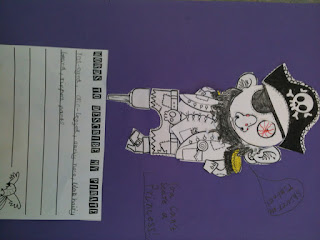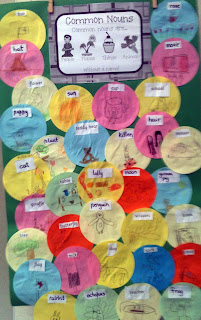So little time, so much teaching to be done!
The children are having a fantastic time at swimming, but with specialist classes, it leaves us very little time in the classroom. When we are in the room we have been trying hard to get through as much work as possible and to maximise our learning!
Who, what, where, when?
In English, we have been looking more closely at questions. The children have talked about the sorts of words we use to ask questions and we have had a go at writing out own questions using some of these words. More importantly, we have learnt that you can't write a question without using a question mark.Location, location, location
I am absolutely passionate about using picture books in all aspects of my teaching, but I particularly love using them in Maths. There are so many wonderful books that deal with Mathematical concepts and our focus for this week, mapping and location language lends itself to using many great books. Two of my favourite books for teaching these concepts are "Alexander's outing" by Pamela Allen and "The shopping basket" by John Burningham. Naturally, we used both of these books this week!After reading "Alexander's outing" the children had a go at making their own maps showing a route that Alexander took on his adventure. They could arrange the landmarks in any order, but had to write a description of his route using direction words like through, over, around, along and past. We have some wonderful artists in the class.
With "The shopping basket", we looked at a different aspect of mapping: co-ordinates. After practising finding the location of things using grid co-ordinates, the children placed pictures of places and animals encountered by Steven in the story onto their own grids. They then had to write the co-ordinates of each item.
Shiver me timbers!!!!
To tie in with our unit on water, we did a few pirate activities this week. The first of these was creating our own pirate using a really fun template I found. This is the link to it Draw a pirateAfter spending heaps of time making their pirate, the children wrote descriptive words and phrases about their pirate. They will use this for the basis of a descriptive text next week.
During our exploration of maps, we noticed that a lot of maps had compass roses on them. This led to some online games and discussion about the different points of a compass. To expand on this, we also created our own pirate maps using a template from the same site as our crazy pirates. Pirate map
To finish the week we had a fantastic session using our Beebots and Probots to rotate through a range of different location activities. Lots of fun and lots of real life application of the concept!
During the week you could...
Talk about what questions are and get your child to ask lots of questions about what they read in their take home books.Get you child to write a description about a member of the family, or a place they have visited recently
Practise reading maps and finding locations using a street directory or Google maps on your phone or iPad
Try these location/mapping games
Bike route
Billy bug
Captain Slackbeard's Treasure Hunt
Pin It now!




























































